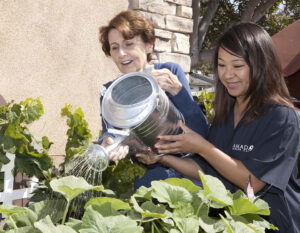More and more seniors are embracing the idea of moving in with their adult children these days. Recent data from Pew Research Center shows that a record 18 percent of the U.S. population (nearly 60 million people) are living in households of two or more generations of adults. The pandemic and practical lifestyle concerns lead the reasons, like pooling resources to cover the ever-rising costs for housing, utilities, groceries, and childcare. For some seniors, the decision to move in with adult children is based on emotional reasons, like wanting to enjoy more time with grandchildren or avoiding a move into an assisted living community.
Senior parents and adult children living together in a multigenerational home can foster a stronger bond with family members while providing a sense of security and support. However, this transition is not without its challenges. If you are a senior or an adult daughter or son considering a multigenerational family lifestyle, take time to explore the dos and don’ts for seniors moving in with their adult children before taking the plunge.
Dos for Senior Parents Living with Adult Children and Grandchildren
Open and Honest Communication: Before making any decisions, engage in open and honest conversations with your adult children. Discuss your expectations, concerns, and individual needs. It’s essential to establish clear lines of communication from the outset, fostering an environment of trust and understanding.
Define Boundaries: Establishing boundaries is crucial to maintaining individual independence and privacy. Discuss personal space, daily routines, and the division of household responsibilities. Encourage a respectful dialogue where everyone’s needs are considered and compromises can be reached.
Plan for Aging in Place: Ensure that the living environment is senior-friendly and accommodating. Make necessary modifications such as grab bars in the bathroom, adequate lighting, and accessible furniture. Address any safety concerns and work together to create a comfortable space that meets your specific needs.
Maintain Independence: Seniors should retain a level of independence and autonomy. Adult children are encouraged to allow them to participate in decision-making processes, contribute to household tasks, and engage in activities that bring them joy. This fosters a sense of purpose and self-worth in seniors, promoting their overall well-being.
Seek Community Engagement: Seniors should strive to maintain connections outside the home by participating in social activities or joining local clubs and organizations. Engaging with peers and pursuing personal interests helps prevent isolation and fosters a sense of belonging.
Don’ts for Co-Habituating Boomer Parents and Millennial Kids
Make Assumptions: Seniors and adult children should avoid making assumptions about each other’s expectations, responsibilities or limitations. Communication is key, so take the time to express concerns, ask questions, and clarify any misunderstandings. This will help in avoiding potential conflicts and promoting a harmonious living environment.
Overstep Boundaries: It’s important for both seniors and adult children to respect each other’s boundaries. Avoid micromanaging or trying to control each other’s lives. Instead, focus on supporting one another and finding a balance that allows for independence and interdependence.
Neglect Self-Care: Seniors moving in with adult children may find themselves dedicating their time and energy to family matters. While caring for loved ones is important, it’s equally crucial to prioritize self-care. Maintain hobbies, engage in physical activity, and allocate time for personal relaxation and rejuvenation.
Disregard Financial Planning: Finances can be a sensitive topic, but it’s essential to address them openly and proactively. Discuss financial responsibilities, contributions, and potential adjustments that may be needed. Consider seeking professional advice to ensure a sustainable financial plan that benefits everyone involved.
Ignore Conflict Resolution: Senior parents and adult children living together can sometimes lead to conflicts or disagreements. It’s important to address conflicts in a constructive and respectful manner. Encourage open dialogue, active listening, and a willingness to find compromises that accommodate everyone’s needs and concerns.
Plan Carefully to Ensure Harmony in Multigenerational Household
The decision for seniors to move in with their adult children is a significant life transition that requires careful consideration and planning. By following these dos and don’ts, families can create a supportive and fulfilling living arrangement for all involved. Remember, open communication, respect for boundaries, and a focus on individual well-being are the keys to a successful and harmonious intergenerational living experience.
Remember that Amada Senior Care is here for families as a trusted resource for seniors aging in place. Whether you are a senior or an adult daughter or son of a senior loved one, you are welcome to reach out for information, guidance and support should senior members of your multigenerational household need more assistance at home. CLICK HERE to find an Amada office near you.
“Dos and Don’ts for Seniors Moving in with Adult Children,” written by Michelle Flores, Amada blog contributor.















